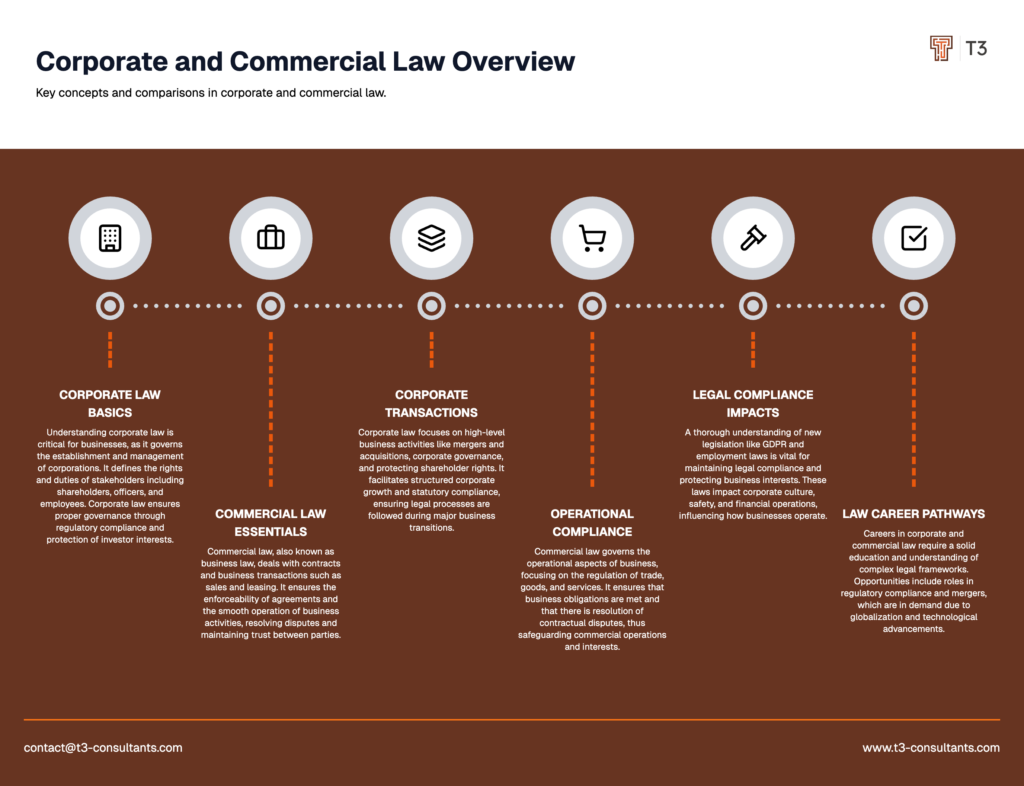
Corporate Law vs Commercial Law: Key Differences Explained
Introduction to Corporate and Commercial Law
In the fast-paced world of business, the ability to understand the ins and outs of corporate and commercial law is indispensable for both legal and business professionals. These areas of law are foundational in many business settings, ensuring that organizations maintain compliance and operate within the established legal constructs.
Corporate law is the legal foundation that pertains to the establishment, governance, and regulation of corporations. It deals with aspects such as shareholder rights and mergers and acquisitions, providing frameworks to uphold the structure and operations of a company. In contrast, commercial law focuses on the regulation of business and trading practices that affect individuals and businesses, including sales practices and competition.
Understanding the boundary between corporate and commercial law is the first step in building an effective legal framework that supports growth and compliance in the ever-changing global business environment.
Understanding Corporate Law
Corporate law is an essential legal specialty that governs the establishment, functionality, and oversight of corporations. This area of law is critical for businesses of all sizes as it establishes the legal principles under which a corporation must operate. Key components include the privileges and obligations of every party in a corporation: stockholders, workers, officers, and other stakeholders.
Corporate law deals with various issues, including corporate governance, compliance, mergers, acquisitions, and dissolutions. By setting normative laws, corporate governance helps prevent conflicts and ensures that transactions and business activities are seamless and empowered.
Corporate law also focuses on the protection of investor interests through securities law and other protective regulations, regulating fundraising and requiring transparency with proprietary and financial information. It assists in conflict resolution and provides legal remedies.
Finally, the integration of corporate law with business practices offers organizations a defense against legal liabilities. It regulates contracts, intellectual property, taxes, and labor laws, ensuring compliance and fostering a successful relationship with clients and investors through a ‘win-win’ legal synergy.
Defining Commercial Law
Commercial law, also known as business law, governs business and commercial transactions. It involves contracts, sales, and the securing of these transactions. At its core, commercial law is about the formation and regulation of contracts, which govern business transactions.
Without commercial law, the business world would lack enforceable agreements. It extends to transactions like selling cars or leasing equipment. Commercial law is necessary for settling business disputes and representing clients in court.
Businesses must comply with all laws governing their operations. With globalization and new technology, protecting business interests and ensuring efficiency is crucial. Commercial law serves to protect and preserve business operations.
Important Distinctions Between Corporate and Commercial Law
Corporate Law
Corporate law covers incorporation, governance, and dissolving of corporations. It encompasses formation, registration, division of power, and shareholder rights, including mergers and acquisitions.
Corporate law ensures all legal processes for actions like mergers are followed, protecting stakeholders and fulfilling statutory obligations.
Commercial Law
Commercial law handles the operational side of the business. It’s dedicated to contracts, sales of services and goods, and other business interactions. It ensures obligations between parties are met and disputes are resolved, maintaining the flow of goods and services.
An example is the contract between a company and its suppliers, detailing obligations about transactions, delivery, and payment. Commercial law resolves disputes over such contracts.
The Comparison
While both areas are crucial for businesses, the most significant difference is their focus. Commercial law regulates interactions to ensure operational flow, while corporate law concerns high-level aspects like incorporation.

Practical Implications of Newly Enacted Legislation
Understanding new laws is crucial for businesses and individuals in commercial and corporate settings. Compliance with laws like GDPR is essential to avoid fines. Employment law protects rights and influences corporate culture.
In scenarios like construction, regulations must be followed for safety, impacting businesses financially and morally. Laws protecting intellectual property aid in product development and distribution, benefiting businesses.
These practical implications maintain business order and help businesses comply with legal obligations, reaching new heights.
Exploring Careers in Corporate and Commercial Law
Corporate and commercial law offers complex yet rewarding career paths, covering mergers, acquisitions, contract disputes, and regulatory compliance. Globalization and technological advancement increase demand for skilled professionals in these areas.
Specializing in these fields requires rigorous education, often starting with an undergraduate degree, followed by a Juris Doctor (JD). Courses in contracts, business organizations, and commercial transactions build legal foundations. Internships and clerkships provide practical experience.
Bar admission is mandatory, alongside a dedication to staying informed about evolving laws and regulations. This expertise can lead to roles like in-house counsel or equity partners at law firms.
In conclusion, this exploration covers the complexities of corporate and commercial affairs, providing insight into these areas. Understanding industry developments and standards is crucial as corporate environments grow and transform. By staying informed and innovative, professionals can thrive and contribute to the corporate field.
